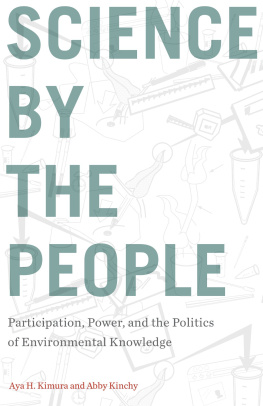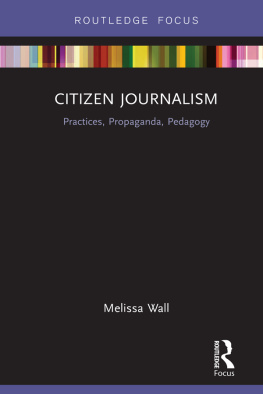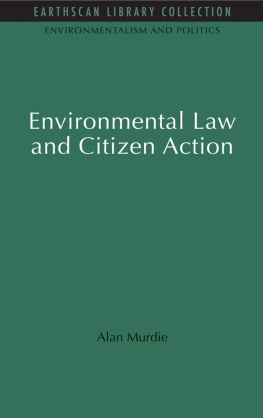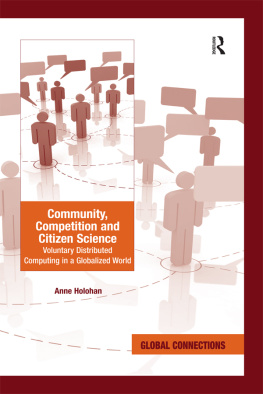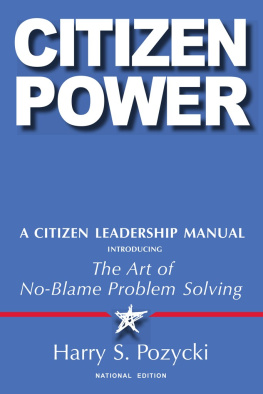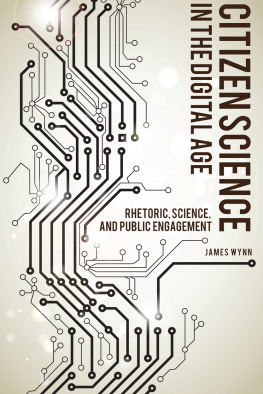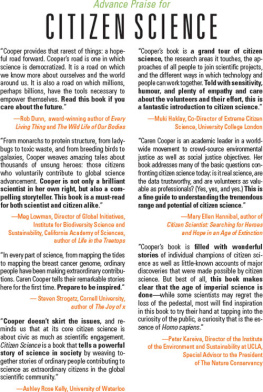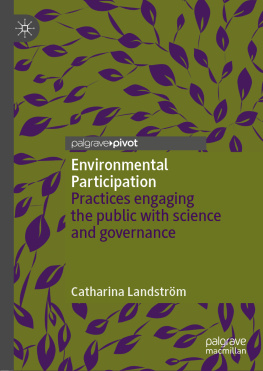Science by the People
Nature, Society, and Culture
Scott Frickel, Series Editor
A sophisticated and wide-ranging sociological literature analyzing nature-society-culture interactions has blossomed in recent decades. This book series provides a platform for showcasing the best of that scholarship: carefully crafted empirical studies of socioenvironmental change and the effects such change has on ecosystems, social institutions, historical processes, and cultural practices.
The series aims for topical and theoretical breadth. Anchored in sociological analyses of the environment, Nature, Society, and Culture is home to studies employing a range of disciplinary and interdisciplinary perspectives and investigating the pressing socioenvironmental questions of our timefrom environmental inequality and risk, to the science and politics of climate change and serial disaster, to the environmental causes and consequences of urbanization and war making, and beyond.
Available titles in the Nature, Society, and Culture series:
Diane C. Bates, Superstorm Sandy: The Inevitable Destruction and Reconstruction of the Jersey Shore
Elizabeth Cherry, For the Birds: Protecting Wildlife through the Naturalist Gaze
Cody Ferguson, This Is Our Land: Grassroots Environmentalism in the Late Twentieth Century
Aya H. Kimura and Abby Kinchy, Science by the People: Participation, Power, and the Politics of Environmental Knowledge
Anthony B. Ladd, ed., Fractured Communities: Risk, Impacts, and Protest against Hydraulic Fracking in U.S. Shale Regions
Stefano B. Longo, Rebecca Clausen, and Brett Clark, The Tragedy of the Commodity: Oceans, Fisheries, and Aquaculture
Stephanie A. Malin, The Price of Nuclear Power: Uranium Communities and Environmental Justice
Kari Marie Norgaard, Salmon and Acorns Feed Our People: Colonialism, Nature, and Social Action
Chelsea Schelly, Dwelling in Resistance: Living with Alternative Technologies in America
Diane Sicotte, From Workshop to Waste Magnet: Environmental Inequality in the Philadelphia Region
Sainath Suryanarayanan and Daniel Lee Kleinman, Vanishing Bees: Science, Politics, and Honeybee Health
Science by the People
Participation, Power, and the Politics of Environmental Knowledge
Aya H. Kimura and Abby Kinchy
Rutgers University Press
New Brunswick, Camden, and Newark, New Jersey, and London
Library of Congress Cataloging in Publication Number: 2019005304
A British Cataloging-in-Publication record for this book is available from the British Library.
Copyright 2019 by Aya H. Kimura and Abby Kinchy
All rights reserved
No part of this book may be reproduced or utilized in any form or by any means, electronic or mechanical, or by any information storage and retrieval system, without written permission from the publisher. Please contact Rutgers University Press, 106 Somerset Street, New Brunswick, NJ 08901. The only exception to this prohibition is fair use as defined by U.S. copyright law.
www.rutgersuniversitypress.org
Contents
Every book has a genealogy. This one arises in a particular political moment but builds on many years of observations, reflections, and experiences, both professional and personal. We wrote this book when antiscience sentiment seemed to grab the center of power for environmental governance and regulation in the United States, the country where we both work. It was exciting to see people organize to defend public commitments to science and environmental protection, yet we had an uneasy reaction to slogans such as There are no sides to science and Science is facts. In an effort to counter the Trump administrations dismissal of science, the proscience discourse seemed to experience a full swing back to an ideal of science as separate from and uncontaminated by politics and beliefs. But as sociologists who study how people use scientific inquiry to fight for sustainability and environmental justice, we know that science and values are inseparable.
Indeed, the research we did for this book is inevitably influenced by our values as well as our professional and personal positions in society. We talk about our values in chapter 2 of this book, but to increase our transparency about this project, we want to share some of the experiences that shaped the perspectives that we offer in this book. We contributed equally to this book, but here and on the title page, we go in alphabetical order.
Aya H. Kimura:
I did not grow up counting birds or observing butterflies, but I wish I had! As a child in Japan, I thought hard sciences were for smart kids and had nothing to do with me. But now that I have two kids, I get excited when I hear about birds and butterflies and how children can participate in data collection with scientists. As a mother who is seriously worried about the future livability of the planet for my children and all children, I know that knowledge about nature and the living creatures with which we cohabit this earth is incredibly important.
As I became concerned with environmental issues, I understood science as an integral part of addressing the problems. My passion for understanding environmental destruction brought me to the School of Forestry and Environmental Studies at Yale for my masters degree. There, I was lucky to become a research assistant to Arun Agrawal, a renowned scholar of commons and indigenous knowledge, and we compiled cases of community management of natural resources. I was also mentored by Michael Dove and Jim Scott, whose works on local knowledge also opened my eyes to different practices besides what is typically legitimated as science.
I went on to pursue a PhD in environmental sociology, continuing my interests around sustainability and knowledge. For my dissertation, I decided to look at the politics of food and agriculture. More specifically, my topics were fortification and biofortification in developing countries (I did my fieldwork in Indonesia). I examined how Western scientific knowledge was reconfiguring the meaning of food and food insecurity. Following the feminist methodology of studying up, my focus was on powerful actors such as multinational corporations, Western scientific expertise, international philanthropic organizations, and foreign aid donors that seemed to push a highly circumscribed idea of good food. This was the central issue of my first book, Hidden Hunger: Gender and the Politics of Smarter Foods. But I was also interested in how ordinary people were reclaiming foodin the form of, for instance, food sovereignty movementsso I started to look at the role of science-doing by regular people in my subsequent work. For example, one of my projects examined how regular women engaged with food-quality assurance in collaboration with food producers in Japanese cooperatives.
After the 2011 Fukushima nuclear accident, I began researching citizen scientists testing for radiation (I wrote about the genealogy of this project in the preface for the book Radiation Brain Moms and Citizen Scientists, if you are interested in hearing about this). I interviewed many citizen science groups, and I met so many inspiring people. They were measuring a lot of different things and gave information to people who were desperate to know how to protect their families and themselves. Citizen scientists were not doing this for money or even prestige (there was a lot of policing around radiation concern); they were volunteering their time and resources while often raising children, caring for the elderly, and working their real jobs.

